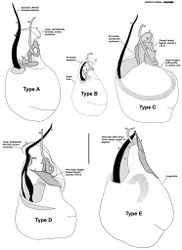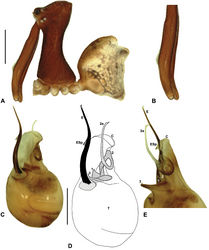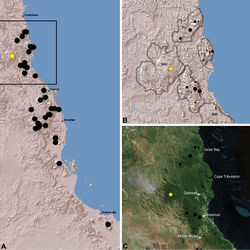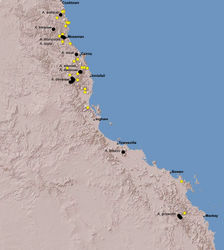Austrarchaea karenae
| Notice: | This page is derived from the original publication listed below, whose author(s) should always be credited. Further contributors may edit and improve the content of this page and, consequently, need to be credited as well (see page history). Any assessment of factual correctness requires a careful review of the original article as well as of subsequent contributions.
If you are uncertain whether your planned contribution is correct or not, we suggest that you use the associated discussion page instead of editing the page directly. This page should be cited as follows (rationale):
Citation formats to copy and paste
BibTeX: @article{Rix2012ZooKeys218, RIS/ Endnote: TY - JOUR Wikipedia/ Citizendium: <ref name="Rix2012ZooKeys218">{{Citation See also the citation download page at the journal. |
Ordo: Araneae
Familia: Archaeidae
Genus: Austrarchaea
Name
Austrarchaea karenae Rix & Harvey sp. n. – Wikispecies link – ZooBank link – Pensoft Profile
Vernacular name
Windsor Tableland Assassin Spider
Type material
Holotype male: Windsor Tableland, [Windsor Tableland National Park], 1.2 km past barracks, Queensland, Australia, 16°15'S, 145°02'E, QM berlesate, stick brushing, rainforest, 1060 m, 24.XI.1997, G. Monteith (QMB S43060).
Etymology
The specific epithet is a patronym in honour of Dr Karen Edward, for her contributions to our understanding of Wet Tropics biogeography, and for her great friendship to MGR and MSH over many years.
Diagnosis
Austrarchaea karenae can be distinguished from all other Archaeidae from north-eastern Queensland except Austrarchaea tealei sp. n., Austrarchaea thompsoni sp. n. and Austrarchaea wallacei by the presence of a triangular spur on the embolus (Figs 9D–E); from Austrarchaea thompsoni sp. n. by the presence of a prominent, triangular tegular sclerite 1 (TS 1), which is visible in ventral view (Fig. 9D); and from Austrarchaea tealei sp. n. and Austrarchaea wallacei by the shape of tegular sclerite 3 (TS 3), which has a single, sharply pointed process distally (Fig. 9D).
Description
Holotype male: Total length 2.97; leg I femur 3.17; F1/CL ratio 2.74. Cephalothorax dark reddish-brown; legs tan-brown with darker annulations; abdomen mottled grey-brown and beige, with darker brown dorsal scute and sclerites (Fig. 9A). Carapace tall (CH/CL ratio 2.12); 1.15 long, 2.49 high, 1.09 wide, ‘neck’ 0.61 wide; bearing two pairs of rudimentary horns; highest point of pars cephalica (HPC) near posterior third of ‘head’ (ratio of HPC to post-ocular length 0.65), carapace gently sloping posterior to HPC; ‘head’ moderately elevated dorsally (post-ocular ratio 0.32). Chelicerae with short brush of accessory setae on anterior face of paturon (Fig. 9B). Abdomen 1.59 long, 1.13 wide; with two pairs of dorsal hump-like tubercles (HT 1-4); dorsal scute fused anteriorly to epigastric sclerites, extending posteriorly to first pair of hump-like tubercles; HT 3-4 each covered by separate dorsal sclerites. Unexpanded pedipalp (Figs 9C–E) of Type A morphology (Fig. 6), with large, retrolaterally directed, arched conductor; embolus distally directed, slightly sinuous, with short triangular spur adjacent to distal rim of conductor, embolus projecting beyond distal rim of conductor by ~1/2 length of exposed embolic portion; tegular sclerite 3 (TS 3) short, spur-like, with flattened proximal portion and sharply pointed, claw-like apex; TS 2-2a looped over retrolateral edge of conductor, TS 2 with pointed, subtriangular apex, TS 2a projecting beyond distal rim of conductor but not extending to near tip of embolus; TS 1 broadly triangular in ventral view.
Female: Unknown.
Distribution and habitat
Austrarchaea karenae is known only from the Windsor Tableland, 44 km north-west of Mossman (Figs 18, 25). The single known specimen was collected in high altitude tropical rainforest.
Conservation status
Unknown (data deficient).
Original Description
- Rix, M; Harvey, M; 2012: Australian Assassins, Part III: A review of the Assassin Spiders (Araneae, Archaeidae) of tropical north-eastern Queensland ZooKeys, 218: 1-50. doi
Images
|



